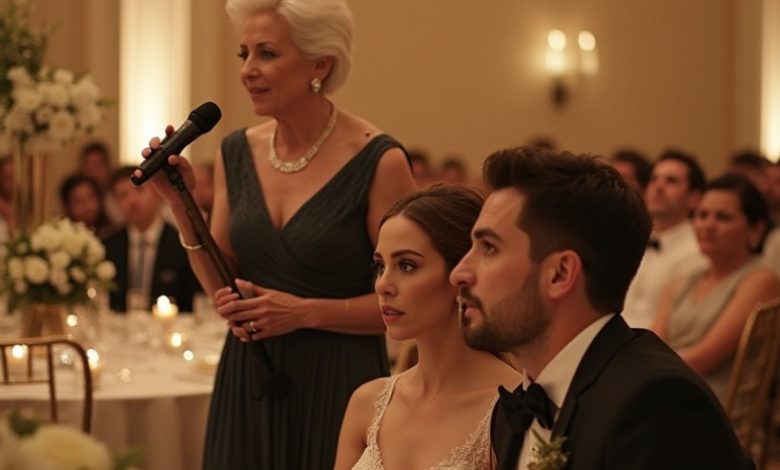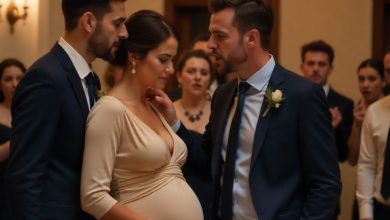When a Mother-in-Law Surprised the Bride With Her Secret

At my son’s wedding, the bride leaned close to her friends and whispered in Arabic, “That woman doesn’t understand. I only care about the money.” I stayed silent the whole night. But when the moment for the toast came, I stood, smiled, and answered her back in perfect Arabic… and the entire room froze in shock.
The ballroom sparkled as if it had been plucked from a dream. Chandeliers glittered overhead, their crystals scattering light across golden curtains and polished marble floors. Waiters in crisp uniforms moved like shadows between tables, topping off champagne flutes and setting down plates of delicate appetizers. The air buzzed with laughter, clinking glasses, and the hum of a string quartet playing in the corner.
I sat quietly at my assigned table, my hands folded neatly in my lap, watching it all as though I were an outsider looking in. To everyone else, this was a celebration of love and union. To me, it already felt like something else—something colder.
My son, Daniel, passed by, his face glowing with happiness. He bent slightly toward me, his voice low, concerned.
“Mom, are you okay?”
I forced a smile, one that I hoped would hide the heaviness pressing on my chest.
“I’m fine, darling,” I whispered.
He squeezed my hand, warm and reassuring, before his new bride, Ila, swept in gracefully and drew him away toward another group of guests. She looked radiant, moving with practiced ease, her every gesture polished, her smile flawless. To everyone else, she was the perfect bride.
I wanted so badly to believe in that image for Daniel’s sake. This was his big day, his second chance at happiness after years of loneliness. He deserved joy. He deserved peace. I told myself that perhaps what I had already overheard—those cruel words in Arabic—had been a misunderstanding, or maybe nerves. Maybe once the night ended, things would settle into something kinder.
I tried to convince myself of that as I sat surrounded by her relatives and their friends. Their conversations floated around me, full of business deals, luxury holidays, and expensive cars. My own side of the family was much smaller, a few cousins and friends scattered across two tables. They looked just as out of place as I felt. I caught my cousin Margaret’s eye, and she gave me a small, firm nod. A silent message: stay strong.
When the salads came out—tiny works of art with cheeses I couldn’t name—I set my fork down and reminded myself of my promise. Do it for Daniel. Don’t spoil his night.
It was then that Ila glided toward me, her posture perfect, her eyes glittering. She leaned in, her voice sugary.
“I hope you’re enjoying yourself,” she said.
“It’s a beautiful wedding,” I replied softly. “You both look very happy.”
“Thank you.” She tilted her head and walked away, leaving behind the faint trace of expensive perfume. To anyone watching, it was a simple, polite exchange between a bride and her mother-in-law. But beneath her words, I felt the sting of something else—mockery, thinly disguised.
The hours moved on. Dancers swayed. Glasses refilled. Toasts were made. And I kept hoping I was wrong. But then the music softened for their first dance, and the golden lights dimmed, and hope shattered.
Ila returned to her circle of bridesmaids, her voice low but audible, her eyes sliding toward me like blades. She whispered in Arabic, the language she assumed was a shield.
“Look at her, sitting there all alone,” she murmured. “Like a stray cat waiting for scraps.”
The women laughed behind their manicured hands. Their giggles floated across the air like shards of broken glass.
My hand trembled slightly as I lifted my water glass. Daniel, passing by with his cheeks flushed from champagne, didn’t notice. He didn’t hear. He didn’t see the way his wife’s eyes turned toward me like daggers. And I couldn’t bring myself to tell him—not yet.
Minutes later, she came back to me, her tone dripping sweetness. “Are you having fun?”
“It’s a lovely evening,” I said evenly, though my heart pounded in my chest.
“Good,” she replied, tilting her head. Then, leaning closer, her words dropped into another cutting whisper, once again in Arabic.
“She really thinks she belongs here.”
And then she straightened, laughing as though she had shared a charming secret.
Something inside me hardened. The fury that rose wasn’t hot—it was icy and clear. This wasn’t nervous chatter. This was contempt, deliberate and cruel. She thought I was powerless, too insignificant to matter. She thought I couldn’t possibly understand her words.
But she was wrong.
Fifteen years of teaching Arabic at the university had left me fluent. Every phrase she thought was hidden was carved clearly in my mind. Every insult landed, sharp and unforgiving. She believed she was safe behind a wall of language. But I knew every brick in that wall, and tonight, I would tear it down.
My late husband’s voice whispered in my memory: Evelyn, never let anyone silence you. Your dignity is worth fighting for.
I straightened in my chair, my resolve firm. I had come to support my son, but now I realized I was here for something more.
The DJ’s voice boomed through the hall, announcing it was time for toasts. Laughter faded, glasses were lifted. Ila’s uncle spoke first, delivering a flowery speech about loyalty and fortune. Applause followed. Then Ila caught my eye and gave me a sly, smug smirk.
That was the moment.
I rose slowly from my seat. Daniel looked startled, then smiled with encouragement. Ila’s face froze, her confidence slipping just slightly.
I walked to the center of the ballroom. Chandeliers glittered above me. All eyes followed me as I took the microphone.
“Tonight,” I began in English, my voice steady, “is a celebration of love and family. I have heard many beautiful words. Now, it is my turn.”
Then I paused, drew a breath, and switched into flawless Arabic.
“I wish the bride and groom a long and joyful life,” I said, my tone smooth and precise. “May they always treat one another with respect. For without respect, love cannot survive.”
Gasps rippled through the room. Ila’s relatives exchanged stunned looks. Her bridesmaids froze, whispering frantically. Ila’s face drained of color.
“You… you speak Arabic?” she stammered, her voice thin.
I met her gaze with calm steel. “I understood every word you said tonight.”
The hall erupted in murmurs.
“I heard you call me a stray cat,” I continued, still in Arabic. “I heard you say I did not belong. And I heard the laughter you shared at my expense.”
“This is ridiculous!” Ila snapped, switching back to English. Her voice was sharp, rising. “You’re twisting everything!”
“No, Ila,” I said, still calm. “You twisted it when you chose to insult me on the night of my son’s wedding. You thought your words were safe. They were not.”
Daniel stepped forward, pale. “Ila… is this true?”
“She’s jealous!” Ila cried, clutching his arm. “She wants to ruin this!”
But doubt was already spreading like fire. Guests whispered. Relatives stared. The truth had broken through, undeniable.
I raised my glass high. “To my son and his bride,” I said, my voice carrying. “May they remember that love cannot thrive where contempt takes root.”
The toast was polite on its surface, but sharp underneath—sharp enough to slice through every falsehood in the room. I sipped, set down my glass, and returned to my seat. The applause that followed was hesitant, scattered. But Ila’s mask had crumbled.
Her fury simmered, her whispers turned frantic. Daniel stood torn between us, confusion and anger etched into his face. He hadn’t seen this side of her until now. But the entire room had.
Ila had thought I was powerless. Tonight, she learned otherwise.
And as I sat back down, I knew one thing with certainty: the marriage might have begun that night, but the truth had already cracked its foundation wide open.










